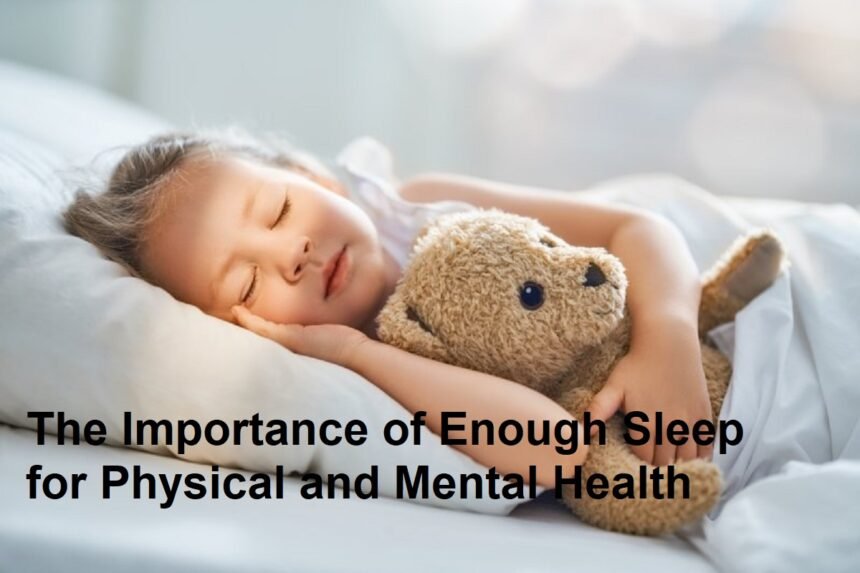Introduction
In today’s busy world, sleep often feels like a luxury. Many people sacrifice rest to meet deadlines, scroll on their phones, or binge-watch shows late into the night. But the truth is, sleep is not optional—it’s essential.
The importance of enough sleep goes far beyond avoiding morning grogginess. Good sleep strengthens your body, sharpens your mind, and boosts your mood. On the other hand, poor rest can lead to sleep disorders, weaken your immune system, and harm long-term health.
This article explores why sleep matters, the key benefits of sleep, and practical steps to build healthy sleep patterns.
Why Sleep Is So Important
Rest for the Body
During sleep, your body repairs muscles, restores energy, and regulates hormones. Without enough rest, you may feel tired, sluggish, and more prone to illness.
Rest for the Mind
Your brain processes information, consolidates memories, and clears toxins while you sleep. A lack of quality sleep can impact decision-making, focus, and emotional stability.
1. Benefits of Sleep for Physical Health
Sleep is like fuel for your body. Consistently getting 7–9 hours of rest supports nearly every system.
Key Benefits:
- Strengthens the immune system.
- Supports heart health by regulating blood pressure.
- Helps maintain a healthy weight by balancing appetite hormones.
- Boosts energy for daily activities.
2. Benefits of Sleep for Mental Health
The benefits of sleep extend to emotional well-being too. People who sleep well are generally happier and less stressed.
Mental Health Advantages:
- Improves concentration and productivity.
- Reduces anxiety and mood swings.
- Enhances creativity and problem-solving.
- Lowers risk of depression and burnout.
3. Common Sleep Disorders
Sometimes, poor rest isn’t just about late nights—it may be due to underlying sleep disorders.
Examples of Sleep Disorders:
- Insomnia: Difficulty falling or staying asleep.
- Sleep apnea: Breathing stops and starts during sleep.
- Restless legs syndrome: Uncomfortable sensations that disrupt rest.
- Narcolepsy: Sudden daytime sleep attacks.
If these issues persist, professional medical advice is necessary.
4. Signs You’re Not Getting Enough Sleep
Not sure if your sleep quality is poor? Look out for these warning signs:
- Feeling exhausted even after a full night in bed.
- Trouble focusing or remembering simple tasks.
- Increased irritability or mood swings.
- Relying heavily on caffeine to function.
5. Tips for Building Healthy Sleep Patterns
The good news? You can take control of your rest. Creating healthy sleep patterns is about consistency and simple lifestyle changes.
Set a Routine
Go to bed and wake up at the same time every day—even on weekends. This trains your body’s internal clock.
Create a Relaxing Bedtime Ritual
Wind down with calming activities like reading, journaling, or meditation instead of scrolling through your phone.
Make Your Bedroom Sleep-Friendly
- Keep the room cool, dark, and quiet.
- Invest in a comfortable mattress and pillows.
- Limit noise and light exposure.
Watch What You Eat and Drink
- Avoid heavy meals before bed.
- Cut down on caffeine and alcohol in the evening.
- Drink water earlier in the day to avoid bathroom trips at night.
- Technology and Sleep: Finding Balance
Blue light from screens tricks your brain into thinking it’s daytime, making it harder to fall asleep.
Practical Tips:
- Turn off screens at least an hour before bed.
- Use “night mode” on your phone or laptop.
- Swap scrolling with a relaxing offline activity.
7. Short Naps: Helpful or Harmful?
Napping isn’t bad—it can boost alertness and performance if done right.
Nap Smart:
- Limit naps to 20–30 minutes.
- Avoid napping late in the afternoon.
- Use naps to recharge, not replace nighttime sleep.
8. When to Seek Help
If you’ve tried improving your sleep patterns but still struggle with rest, it may be time to consult a doctor. Persistent sleep disorders can seriously affect your health if left untreated.
Conclusion
The importance of enough sleep cannot be overstated. Quality rest supports physical health, emotional well-being, and overall happiness. From boosting your immune system to protecting mental health, the benefits of sleep are endless.
By creating healthy sleep patterns, avoiding triggers that disrupt rest, and seeking help when needed, you can prevent sleep disorders and enjoy more energized, productive days.
How many hours of sleep do you usually get each night? Try setting a consistent bedtime this week and see how your energy and mood improve.












